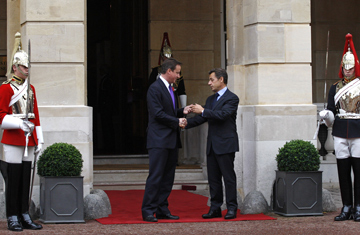
French President Nicolas Sarkozy, center right, talks to British Prime Minister David Cameron as they arrive at Lancaster House in London for a summit on defense and security cooperation on Tuesday, Nov. 2, 2010
Many words might be used to describe the new understanding between Britain and France that will see the two countries setting up a Combined Joint Expeditionary Force, putting their aircraft carriers at each other's disposal and sharing facilities for research and evaluation of their nuclear arsenals. Historic, unprecedented, even radical would surely fit the bill. But after signing two treaties and agreeing to a flurry of declarations in London today with French President Nicolas Sarkozy, British Prime Minister David Cameron deployed his vocabulary as gingerly as a soldier uses a mine detector in the search for IEDs. The move was "practical" and "hardheaded," he said. "This is not about weakening or pooling British or French sovereignty."
Cameron's caution reflects widespread unease on both sides of the Channel that the new arrangement is indeed historic: historically humbling. At the end of September, France unveiled its first reduction in defense spending in several years. October brought news of cuts to Britain's military of 8% over five years. The entente frugale between two cash-strapped nations will leave each potentially needing to seek the other's permission to launch an operation to defend its own citizens. Britain and France will have one aircraft carrier apiece, likely to be out of service for refitting about a third of the time. "You know, in France sovereignty is as touchy a subject as it is in Britain," said Sarkozy, swiftly illustrating the point with a touchy response to a British journalist who wondered what would happen if the U.K., finding its aircraft carrier out of service on the occasion of a crisis and hoping to dispatch France's aircraft carrier to battle instead, encountered French resistance. "If you, my British friends, had to face a major crisis, do you imagine we would sit there with our arms crossed?" asked the President, with a theatrical moue of anger and incredulity.
Yet that is precisely the point of concern. Cameron reminded the audience of ministers, diplomats and journalists assembled to witness the signing that "Britain and France have a shared history through two world wars." Officials have been keen to point out that British troops served under a French commander in Bosnia. But the shared history is littered with less encouraging episodes from the Franco-British soap opera, from Napoleon's rout by the Duke of Wellington at Waterloo through the countries' joint imbroglio at Suez to the more recent, and for many still raw, quarrel over the invasion of Iraq. In 1998, Britain's then Prime Minister Tony Blair and France's then President Jacques Chirac, meeting in the French port of Saint-Malo, trumpeted a new military accord between their nations that was expected to lead to closer, harmonious cooperation in military matters. Instead, the leaders clashed over Iraq only four years later, as Blair argued for the U.S.-led invasion and Chirac challenged its legitimacy. Chirac's views had grown so jaundiced by 2005 that he joked at a meeting with other European leaders that Britain's only contribution to European agriculture was mad cow disease and took a swipe at British cuisine. "One cannot trust people whose cuisine is so bad," he said.
The suspicion is mutual. Under the tabloid headline "Fickle Friends," the Sun greeted Sarkozy's visit with this question: "Can we trust the French?" "Modern French politicians have been a craven lot," declared the newspaper's editorial. "They refused to support us over Iraq and sent tiny numbers of soldiers to Afghanistan. Sarkozy is cut from a different cloth. But what of his successors? Britain cannot afford a defense partner led by politicians without backbones."
The reality such predictably jingoistic responses overlook is that neither Britain nor France can afford not to look for ways of maximizing the bang they get for their increasingly limited military bucks. That's why Washington favors the move, which it hopes will help offset the impact of military cutbacks in Europe. And Britain and France are, despite past contretemps, natural partners, as nuclear powers and Europe's biggest spenders on defense. But whereas Britain has worked closely with the U.S. and other NATO partners for many years, France rejoined NATO's military command only last year, after four decades of self-imposed exile over concerns about the erosion of that precious commodity, sovereignty. The French have developed a distinct military culture and sensibility and use a range of equipment that could impede interoperability. And then, of course, there's the question of language. How will the planned Combined Joint Expeditionary Force — envisaged not as a standing force but as a pool drawn from both countries and across the services — communicate when it starts training exercises next year? English is the customary language for joint military operations, says a British official. He suggests French officers might benefit from language courses.
They wouldn't be the only ones to do so. If this entente is to last to the benefit of both partners, European defense and allies further afield, Britain and France will have to learn a new language — one of trust.
